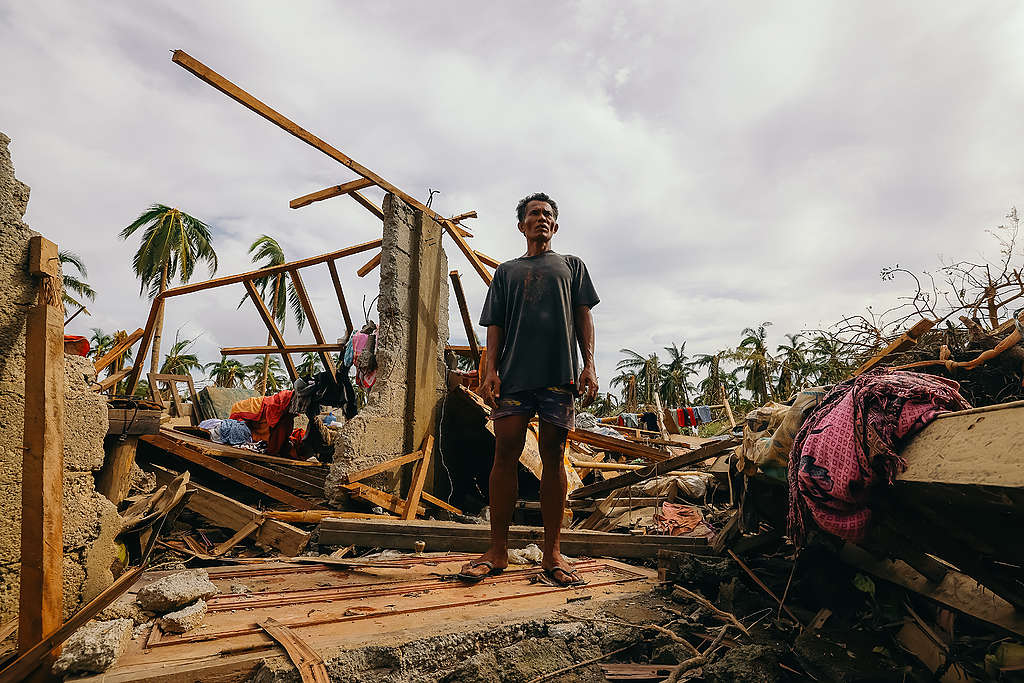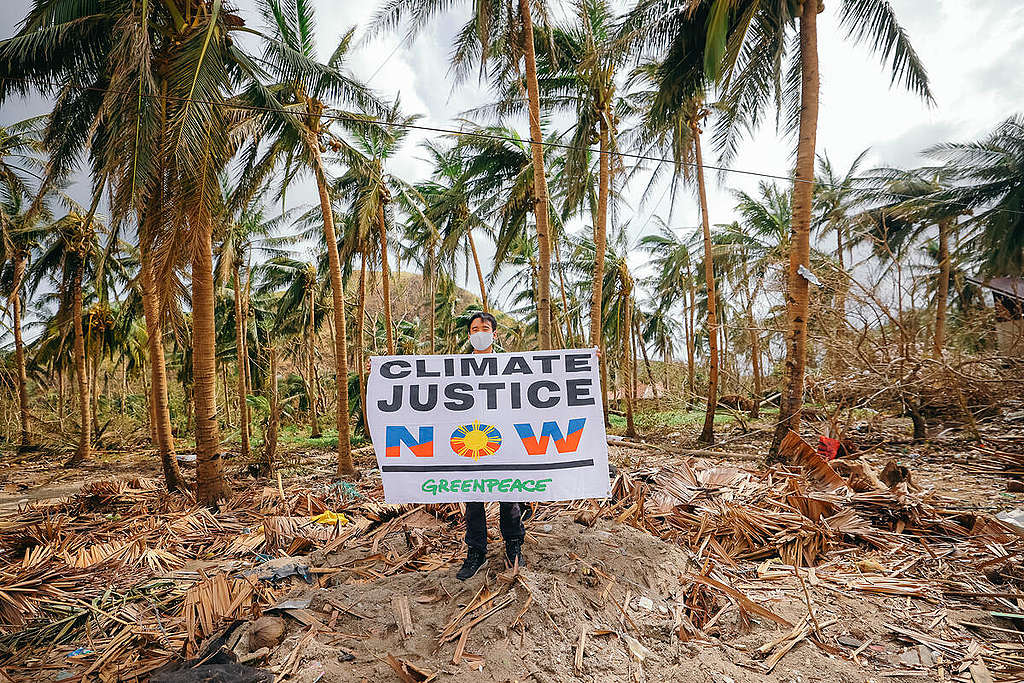QUEZON CITY, Philippines—Amid relief and recovery efforts in the wake of Typhoon Rai (local name Odette), Greenpeace Philippines demanded an end to fossil fuels, and stronger climate action from rich nations, including compensation for loss and damage, aside from more money for climate finance. The environmental group also called on the Philippine government for a comprehensive blueprint to address the climate emergency at home.

The group, which called for a Climate Emergency Declaration last year, is urging the Philippine government to follow through with a coherent climate strategy beyond disaster response that would address long term vulnerabilities, not just catastrophes. At the same time, the group said that in order for communities in climate vulnerable countries like the Philippines to survive, fossil fuels must be phased out, starting with a halt to all new fossil fuel projects. Rich countries must radically decrease their emissions, put more money on the table for climate finance, as well as provide compensation on loss and damage for communities that would have to recover and rebuild after a disaster.
“Continued lack of action on the climate crisis is unacceptable,” said Greenpeace campaigner Virginia Benosa-Llorin. “This is the second year in a row that a supertyphoon left hundreds of thousands of Filipinos homeless, and scrambling to bury the dead. In the past decade, Filipinos have seen the worst typhoons occur year after year. How many more climate disasters do we have to endure before urgent solutions are put in place?”
The Philippines has witnessed an unprecedented number of extreme typhoons in the past decade. Experts noted that Rai rapidly intensified into a supertyphoon over 24 hours just before landfall, in a phenomenon made more likely by increasing global temperatures. An IPCC report released earlier this year affirmed that the climate system is rapidly changing, and the scale of change is unprecedented. It also affirmed that weather extremes will be more intense and more frequent.[1]
“‘Code red for humanity’ is life or death for people in the Philippines,” said Llorin. “Typhoon Odette caused not only billions of physical damage, but also irreparable injury to the Filipinos’ psyche, having lost their homes and even their loved ones. The more the world waits for solutions, the more we suffer the consequences of the lack of action.”

With slow progress on strong and ambitious climate action from rich countries as seen in the COP 26 climate talks last month, Greenpeace believes that there needs to be stronger climate action at home. Particularly, the Philippine government must:
- Hold fossil fuel companies accountable for the climate crisis and call on other countries to do the same. It must also lead the call for a global phase out of fossil fuels toward a just transition to renewable energy.
- Call on rich countries for more ambitious emissions reductions targets, more money for climate finance, and compensation for loss and damage.
- Ensure rapid transition to renewable energy at home by phasing out coal, stopping fossil gas expansion and targeting 50% of RE in the energy mix by 2030.
- Ratchet up the country’s Nationally Determined Contributions (NDC). At the moment, the country has promised a 75% carbon emissions reduction from 2020 to 2030, but the unconditional target is only at 2.72%.
- Ensure the Climate Emergency Declaration is followed through with a coherent climate plan. The government must institute climate action as the central policy of the state, and must protect people and climate on the basis of climate justice. Climate action must also be at the heart of the country’s COVID recovery plan.
As the country focuses on the 2022 elections, Greenpeace Philippines appeals to the public to ensure that climate action and climate justice are part of the electoral agenda. “The country’s next leaders must walk the talk on climate justice, and champion the safety and future of all Filipinos in the face of worsening climate impacts,” said Llorin.
Notes to editors:
Since Saturday, 18 December, a Greenpeace team has been on the ground in Surigao City to set up a solar power system that would support the local government’s disaster response efforts. In Siargao Island, another team is putting up similar equipment to support the relief operations center. Greenpeace has also partnered with Feed.PH to set up community kitchens in relief centers in the said areas, and is partnering with youth groups in the Visayas for more community kitchens and the provision of solar chargers in places where they are needed.
[1] AR6 Climate Change 2021: The Physical Science Basis, UN Intergovernmental Panel on Climate Change
Media Contact:
Maverick Flores (in Manila)
Communications Campaigner, Greenpeace Southeast Asia-Philippines
+639176211552 | [email protected]
Angeli Cantillana (deployed in Butuan/Surigao City)
Communications Campaigner, Greenpeace Southeast Asia-Philippines
+639985959733 | [email protected]
